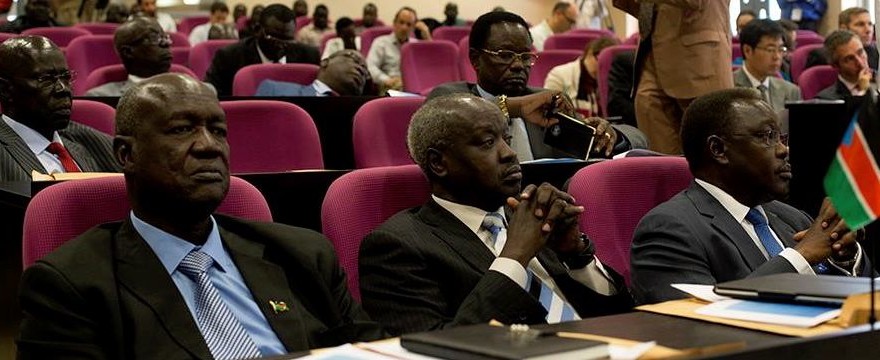SPLM, the ruling party of South Sudan, has fractured since the start of a civil war in December 2013. The faction of the party based in Juba remains under the leadership of President Salva Kiir.
The SPLM-Juba faction controls the cabinet, the presidency, a remnant of the SPLA, and several governorships. In a series of articles, Radio Tamazuj profiles some key party members who have remained loyal to Salva Kiir since the start of the crisis.
Factbox: Nhial Deng Nhial
Nhial Deng Nhial is a South Sudanese politician from the Bahr el Ghazal region. He is an ethnic Dinka and son of a well-known South Sudanese politician, William Deng Nhial, who was assassinated in 1968 allegedly by the Sudanese army.
Born on 1 January 1952, Nhial started his education in his hometown of Tonj in present-day Warrap State, South Sudan, before going to Comboni College in Khartoum, where he graduated in 1975. He was admitted to Khartoum University in 1976 where he studied law, finishing in 1980. Later also he was awarded a law degree (JD) from the University of Dundee in the United Kingdom in 2008.
Fluent in both English and Arabic, Nhial briefly worked with the Sudanese government after finishing university studies, before joining the rebel Sudan People’s Liberation Movement (SPLM) in 1983.
Although he received military training on joining the Sudan People’s Liberation Movement, Nhial was never posted as a combat field commander in the then-rebel controlled territory during the north-south civil war but instead held mostly administrative and diplomatic assignments.
He played a role in coordinating several informal peace talks including the bilateral discussions with the Sudanese government in 1989 following the fall of the civilian government of Sadig al Mahdi to the current government of Omer al Bashir.
Talks initiated by the former United States president Jimmy Carter were held in Nairobi, Kenya, in December 1989 as well as Abuja-1 in 1992 and Abuja-2 in 1993. Other peace initiatives in which he played an organizing role were Barcelona-1 and Barcelona-2.
Nhial became governor in the SPLM-controlled areas covering Greater Bahr el Ghazal region after the 1994 Chukudum convention in which SPLM civil administration structures were first formed. He served in that capacity until late 1997 when he was replaced by Deng Alor Kuol, and then resumed coordination of foreign missions on behalf of the movement.
He was involved in the 2003-2004 Naivasha talks that eventually led to the signing of the peace agreement between the Sudanese government and SPLM.
During this time he was seen as close to the founding SPLM leader, late John Garang de Mabior. In 2004 rumours spread that Garang was planning to dismiss his then-deputy Salva Kiir and replace him with Nhial. The flow of the rumour nearly caused a split in the movement until Garang openly denied the rumour at a high-level leadership meeting held in Rumbek from November-December 2004.
Following the successful conclusion of the Naivasha peace accord, Nhial was proposed to become the Sudanese Foreign Minister in the Government of National Unity but declined and chose instead to work in the regional Government of Southern Sudan (GOSS) in which he was appointed as Minister of Regional Cooperation in 2005 by Salva Kiir, following the death of John Garang in a plane crash in July 2005.
However, he abruptly resigned from the cabinet less than six month later. No clear explanation for this move was made, nor did Nhial himself make public comment on the circumstances leading to his resignation.
He later returned to government and was appointed Minister of SPLA and Veterans Affairs in December 2008, replacing General Dominic Dim Deng who died in a plane crash on 2 May 2008. He returned to the regional cabinet with the military rank of Lieutenant General in the SPLA, overseeing military operations in the border areas with Sudan and against rebel activities in oil-producing areas.
Nhial remained South Sudan’s Minister of Defense through the independence of South Sudan on 9 July 2011 until his appointment on 26 August 2011 as the Minister of Foreign Affairs and International Cooperation.
On 23 July 2013, President Salva Kiir issued decrees dissolving his entire cabinet, dismissing his vice president Riek Machar, and removing Pagan Amum from the position of Secretary General of the Sudan People’s Liberation Movement (SPLM).
This group of dismissed officials and senior members of the SPLM closely associated with Nhial himself called a press conference on 6 December 2013 in which they criticized the leadership of President Salva Kiir. A counter-conference in which Nhial participated alongside other officials, including Defense Minister Kuol Manyang Juuk and Vice President James Wani Igga, hit back at the dissenting group for violating ‘organizational discipline.’
On 13 December, SPLM leaders loyal to President Salva Kiir bypassed convening a Political Bureau meeting to set the agenda for the upcoming National Liberation Council (NLC) meeting and instead went directly into the NLC meeting to deliberate on matters of the party constitution and convention. During these debates Nhial played a low profile role and decided on going with the majority.
Fighting erupted within the presidential guards on 15 December, plunging the country into civil war. In the period that followed, Nhial was tasked by President Salva Kiir to serve as lead negotiator for the government in talks between the warring parties in Addis Ababa.
Nhial Deng Nhial remains chief negotiator and a member of the SPLM Political Bureau (Juba faction). He has children from a previous marriage and remarried in 2013.
File photo: Kuol Manyang Juuk (left), Nhial Deng Nhial (center) and Martin Elia Lomuro (right), August 2014 (UNMISS)
More in this series:
Who’s who of the SPLM-Juba faction: Kuol Manyang Juuk
Who’s who of the SPLM-Juba faction: Kuel Aguer Kuel
Who’s who of the SPLM-Juba faction: Aleu Ayieny Aleu
Who’s who of the SPLM-Juba faction: James Wani Igga
Who’s who of the SPLM-Juba faction: Jemma Nunu Kumba
Who’s who of the SPLM-Juba faction: Telar Ring Deng




